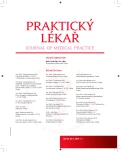-
Medical journals
- Career
Clostridial phlegmona of the abdominal wall in an obese patient with Crohn’s disease
Authors: K. Chrz; R. Fraško
Authors‘ workplace: 1. chirurgická klinika hrudní, břišní a úrazové chirurgie VFN ; Přednosta: prof. MUDr. Zdeněk Krška, DrSc. ; 1. lékařská fakulta Univerzity Karlovy
Published in: Prakt. Lék. 2015; 95(1): 36-41
Category: Case Report
Overview
Clostridial infection represents a serious chapter in the field of surgery. Infections of soft tissue caused by clostridial infection often end in death despite the early diagnosis and appropriate treatment. Authors present a case history of a young overweight patient, immunologically compromised, after a recent biological treatment for Crohn’s disease. The patient developed extensive clostridial cellulitis of the abdominal wall as well as of the proximal part of her lower limb following a banal skin wound. Despite resuscitation and surgical care, the patient died. When treating soft tissue infections, it is particularly important to consider the possibility of an anaerobe infection.
Keywords:
clostridial cellulitis – gas gangrene – Clostridium ramosum – Clostridium tertium
Sources
1. Bednář M. Lékařská mikrobiologie. Praha: Triton 1996.
2. Kašpárková V. Toxiny bakterií rodu Clostridium. Bakalářská práce. Zlín: Univerzita Tomáše Bati 2009. Dostupný z: http://dspace.k.utb.cz/bitstream/handle/10563/10081/kašpárková_2009_bp.pdf.
3. Zeman M, Krška Z, et al. Chirurgická propedeutika. 3., doplněné a přepracované vydání. Praha: Grada Publishing 2011.
4. Revis D. Clostridial gas gangrene. Medscape 2014. Dostupný z: http://emedicine.medscape.com/article/214992-overview
5. Vyhnánek F. Plynatá sněť – standardy postupu. Dostupný z: http://www.infekce.cz/Standardy/PlynataSnetDP.pdf
6. Brabencová S. Diagnostika Clostridium difficile a jeho výskyt ve FN Brno. Bakalářská práce. Oddělení klinické mikrobiologie Fakultní nemocnice Brno Bohunice 2011. Dostupný z: http://is.muni.cz/th/258751/lf_b/diagnostika_clostridium_difficile_a_jeho_vyskyt_ve_fn_brno.pdf
7. Henry H. An investigation of the cultural reactions of certain anaerobes found in wounds. J Pathol Bacteriol 1918; 21(3): 344–385.
8. King BM. Clostridium tertium septicemia. N Engl J Med 1963; 269 : 467–469.
9. Miller DL, Brazer S, Murdoch D, et al. Significance of Clostridium tertium bacteremia in neutropenic and nonneutropenic patients: review of 32 cases. Clin Infect Dis 2001; 32(32): 975–978.
10. Ray P, Das A, Singh K, et al. Clostridium tertium in necrotizing fasciitis and gangraene. Emerg Infect Dis 2003; 9(10): 1347–1348.
11. Veillon A, Zuber A. Recherches sur quelques microbes strictement anaerobies et leur role en pathologie. Arch Med Exp Anat Pathol 1898; 10 : 517–545.
12. Mohadas R, Poduval RD, Unnikrishnan D, Corpuz M. Clostridium ramosum bacteremia and osteomyelitis in a patient with infected pressure sores. Infect Dis Clin Pract 2001; 10(2): 123–124.
13. Woting A, Pfeiffer N, Loh G, et al. Clostridium ramosum promotes high-fat diet-induced obesity in gnotobiotic mouse models. mBio 2014; 5(5): e01530–14. doi: 10.1128/mBio.01530-14.
Labels
General practitioner for children and adolescents General practitioner for adults
Article was published inGeneral Practitioner

2015 Issue 1-
All articles in this issue
- Viral haemorrhagic fevers
- Current treatment of liver abscess – Experience of Surgical Clinic of University Hospital Pilsen
- The impact of the holocaust on the health of survivors
- Interventions for preventing falls in the elderly in institutions: a review
- Change in the level of proline in urine may predict remission or prostatic carcinoma relapse
- Clostridial phlegmona of the abdominal wall in an obese patient with Crohn’s disease
- General Practitioner
- Journal archive
- Current issue
- Online only
- About the journal
Most read in this issue- Current treatment of liver abscess – Experience of Surgical Clinic of University Hospital Pilsen
- Clostridial phlegmona of the abdominal wall in an obese patient with Crohn’s disease
- Viral haemorrhagic fevers
- The impact of the holocaust on the health of survivors
Login#ADS_BOTTOM_SCRIPTS#Forgotten passwordEnter the email address that you registered with. We will send you instructions on how to set a new password.
- Career

